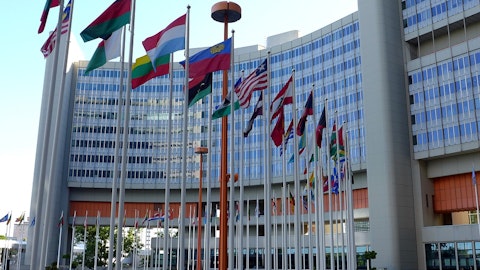In this article, we will look at the 5 hardest-working countries in Africa. We have also discussed interesting insights related to stress and hard work in another article. If you are interested in reading about that along with a more extensive list, head straight to the 15 Hardest Working Countries in Africa.
5. Senegal
Average Work Hours/Week: 44.5
As of 2020, the labor force in Senegal comprises approximately 4,255,422 individuals. The total activity rate hovers around 47.14%, with major gender disparities – 58.89% for men and 36.44% for women. Social security contributions vary for employers and employees based on the nature of the activity. Labor unions and employer associations are present, but social dialogue remains limited in practice.
4. Morocco
Average Work Hours/Week: 44.9
In Morocco, the standard weekly working hours usually amount to 45 hours, with every worker being entitled to a minimum of one day off each week. The workweek can span either five or six days, but the longest duration for a regular workday is capped at 10 hours.
3. Liberia
Average Work Hours/Week: 47.2
Liberia’s workforce is characterized by resilience and determination, making its people some of the most hardworking in the world. Despite facing numerous challenges like a history of civil conflict and limited economic opportunities, Liberians display a strong work ethic and adaptability. Many engage in subsistence agriculture, informal economic activities, and bartering to sustain their livelihoods. Their ability to persevere under challenging circumstances and their commitment to rebuilding their country speaks volumes about their work ethic.
2. Lesotho
Average Work Hours/Week: 49.8
With a population of approximately 2.3 million, Lesotho stands as a testament to hard work. Despite its small size and geographical challenges, it has a strong work ethic. The difficult terrain of the country has not deterred its citizens; instead, it has fostered resilience and perseverance. The workforce often works in agriculture, mining, and manufacturing, striving for economic progress.
1. Gambia
Average Work Hours/Week: 50.8
Gambia has demonstrated incredible economic resilience amidst global challenges, according to the Third Gambia Economic Update by the World Bank. In 2022, despite a challenging global environment, the country achieved a 4.3% real GDP growth, indicating a continued recovery from the COVID-19 pandemic’s impact. The improved agricultural production, increased public consumption, and infrastructure investment have contributed to this positive growth. However, challenges such as rising commodity prices and limited manufacturing inputs availability have affected the country’s overall performance. The services sector, particularly tourism, experienced slow growth, restraining economic progress. Inflation reached decade-high levels in 2022 due to global commodity price shocks.
While the economic outlook for The Gambia remains favorable, risks such as the Ukraine conflict, fiscal issues, climate change, and political uncertainty could impact the country’s economic prospects. The need for financial inclusion is also emphasized to support economic growth and poverty reduction, as many Gambians lack access to financial services, hindering growth potential and job creation. Gambia is the hardest-working country in Africa.
Insider Monkey focuses on uncovering the best investment ideas of hedge funds and insiders. Please subscribe to our free daily enewsletter to get the latest investment ideas from hedge funds’ investor letters by entering your email address below. You can also take a peek at 25 Believable Excuses for Missing Work on Short Notice and 25 Best Work-Life Balance Jobs to Enjoy Life.





